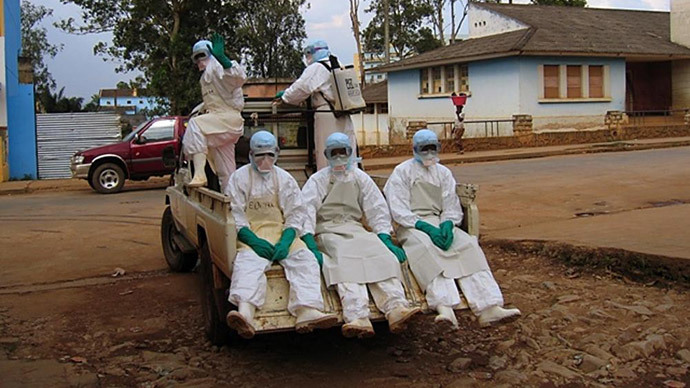
To the uneducated, science looks scary.

At least 8 Ebola aid workers reportedly killed 'in cold blood' by villagers in Guinea
At least eight Ebola aid workers and journalists were reportedly murdered and dumped in a latrine in a remote village in Guinea in a frightening example of the growing distrust locals have of foreigners coming to help stem the mushrooming health crisis.
These deaths are believed to be the first resulting from resistance to international efforts to curb the Ebola outbreak in the region, Reuters reported. Other aid teams have been forced to turn back by crowds in several locations, and a treatment center in Monrovia, Liberia was attacked and looted.
Villagers in an area near the city of Nzerekore used machetes and clubs to attack eight members of a team trying to raise awareness about the disease, officials told the BBC.
"The eight bodies were found in the village latrine," Albert Damantang Camara, a spokesman for Guinea's government, told Reuters on Thursday, adding that they had been "killed in cold blood by the villagers."
Prime Minister Fofana reported that the aid mission included "local administrators, two medical officers, a preacher and three accompanying journalists." They were reportedly attacked by a large crowd, throwing stones, from the village of Wome.
The delegation had arrived on Tuesday to do disinfection work and educate people about preventing Ebola, but residents pelted them with rocks and beat them, according to the Los Angeles Times, citing Guinean radio reports. The group fled into the bush. One journalist who escaped said she heard people looking for her while she hid, according to the BBC.
On Thursday, the bodies were found in the septic tank of a village school in the village, according to Camara. Six people have been arrested and the village is now reportedly deserted. Although a motive for the murders has not been confirmed, a BBC report says many villagers have accused the health workers of spreading the disease. Others do not believe that the disease exists.
Ebola first surfaced in March in southeastern Guinea, where the attacks took place. Since then, it has spread through the lower continent despite international efforts to combat it.
More than 2,600 people in West Africa have died from the disease.
Complicating efforts is the lack of education in remote areas, where some residents don't believe the virus exists. Last month, in the same area where the aid workers were killed, people rioted out of fear that workers disinfecting a market were contaminating people, according to the BBC.
Security for aid workers, for clinics and hospitals, remains a concern in the region. All of the governments affected and the international agencies fighting the epidemic are trying to reach out to the rural communities where misinformation and fear have prevented effective measures to control the spread of Ebola. Until all of the areas with infections have been reached and controls implemented, a reservoir of Ebola will remain and continue to spread, say experts.
The United Nations Security Council declared the Ebola outbreak in West Africa a "threat to international peace and security" Thursday.
Since March, the virus has infected at least 5,357 people, according to World Health Organization (WHO), mostly in Guinea, neighboring Sierra Leone and Liberia. It has also spread to Senegal and Nigeria.
It is the world's worst outbreak of Ebola, with officials warning that more than 20,000 people could ultimately be infected.
U.N. Secretary-General Ban Ki-moon said on Thursday he will create a special mission to combat the disease and deployed staff in the worst-affected states.
Neighboring Sierra Leone has begun a controversial three-day curfew to try to stop the spread of the disease.
No comments:
Post a Comment